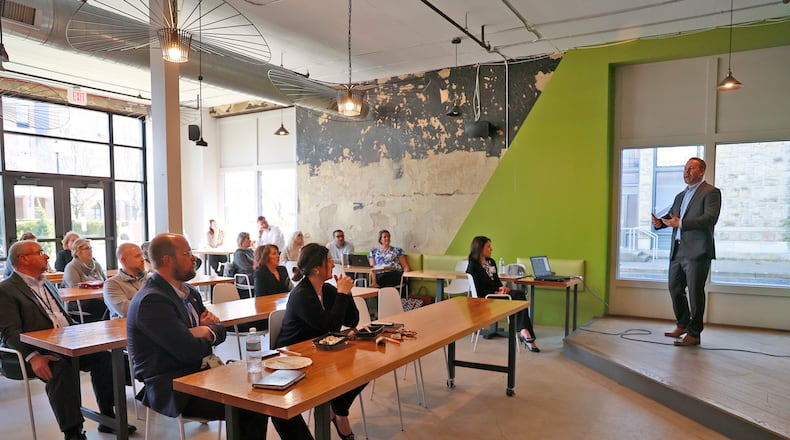For example, he talked about significant improvement in neurology that keeps patients closer to home and about the potential for housing on the Mercy Health campus on the city’s north side that could build a neighborhood for employees.
Nearly 70 people attended the community town hall both in-person and virtually that Groshans led.
Mercy Health — Springfield has nearly 2,000 local associates who last year handled a total of 246,801 medical group patient encounters, 67,284 emergency department visits, 13,468 hospital admissions and 8,446 surgeries.
Groshans said Springfield is one of the busiest hospitals in the state, but he also noted Mercy’s facilities in Enon and Urbana.
He touted efforts in neurological care, including the Musculoskeletal Institute, brain lab and interventional neurology, which is coming soon.
The interventional neurology care will help with the care of stroke patients and keep them closer to home instead of sending them somewhere else.
The equipment will allow staff to intervene to help stop a stroke once a person is having one. This is a different level of care than what’s been offered in the past, and the next closest location with this care is at the Ohio State University Wexner Medical Center, Groshans said.
“It’s a tremendous amount of investment to keep this quality of care close to home,” he said. “It’s truly been a journey, and a lot of the journey is the capabilities of personnel we’ve been able to bring on.”
Health Commissioner Charles Patterson attended the meeting, saying strokes are the next largest cause of death in the community after heart issues, so the importance of offering this type of care locally is very important.
The Musculoskeletal Institute is a “phenomenal site of care” that has physical therapy, rehab, orthopedic and more.
“It’s a one-stop shop for patients with pain, need rehab, physical therapy rheumatology, outpatient neurology, neurosurgery, and it has an outpatient surgery center,” Groshans said. “It’s a concentrated effort to have all of these services in one center to prevent transportation challenges or missed appointments.”
The brain lab includes state-of-the-art equipment and is the only one in the community with the technology, Groshans said.
Mercy Health is also considering building houses on its campus on North Fountain Boulevard to help the workforce by mainly targeting Mercy Health buyers.
Groshans said officials “saw positive momentum” at the 14.5-acre plot of land and looked for ways to bring people in to get them exposed to the community and meet their longer-term needs.
“How do we get folks connected to downtown? How do we bring them life outside of work? What does that do long term for the community?,” he said.
Groshans said Mercy now is looking to develop about 40-50 housing units that will be open to everyone, but first to Mercy Health members. They want to offer those who work for the company but don’t live here a chance to live at the new property, have a good life at work and outside of work and be a long-term fixture in the community.
Groshans noted other improvements, including heart and vascular services; cardio thoracic and vascular surgery; the oncology services with the James Cancer Network and the OSU Wexner Medical Center; and the emergency department services.
The company has invested close to $270 million into the Springfield Regional Medical Center, $1 million in Spring FORWARD, $100,000 to the Second Harvest Food Bank, and provides a $20 million annual economic benefit to the community.
During the last year, Mercy Health has also expanded the use of robots, artificial intelligence and other technology to transform patient care in cardiology, neurology and orthopedics; launched a Maternal-Fetal Medicine program to provide care for women with complicated or high-risk pregnancies closer to home; and added rheumatology services to give patients a new option for getting help with the diagnosis and treatment of arthritis and other diseases of the joints, muscles and bones.
Parent Bon Secours Mercy Health is one of of the five largest Catholic health care systems in the U.S. and the largest not-for-profit private provider in Ireland. They have more than 1,200 sites of care in the U.S. and Ireland, approximately $11 billion in net operating revenue, more than $600 million in community benefits across five states, 48 hospitals, 3,000 providers, 450 consultants in Ireland, and 60,000 total associates.
About the Author

